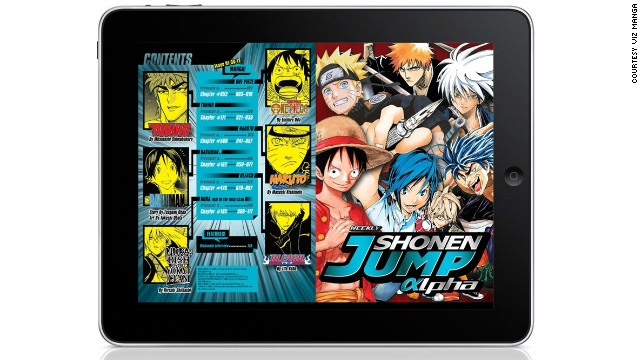In most cases of what’s hip and new, the Japanese are ahead. Otaku worship their eye for culture for a reason, after all.
But it just might be that that same culture is what holds them back when it comes to a landscape that Americans are quickly becoming intimate with: the digital format.
As we move bravely into the digital age and face cries of “Print media is dying!” it’s no surprise that manga is popping up on more iPads than ever before. And Americans love it: The more easy access we have to our favorite media sources, the better.
On the other hand, a country like Japan that is known for its deeply entrenched traditions may not be as easy to convert. After all, modern manga debuted there in the ’40s, but its roots go as far back as the 18th century. It’s not unusual to ride the subway in Tokyo and see people of all ages and stations in life with their faces buried in a hot-off-the-shelves copy of “One Piece” or “Naruto.”
The feeling of holding that trusty book in one’s hand is a habit, a groove of comfort. And replacing it with a tablet presents more complexities to some longtime fans than one might think.
Could the evolution of digital manga be a case where America’s otaku take the lead, and Japan follows suit?
VIZManga has announced that it is the latest to join in the recent movement of digital publishing, debuting its “Shonen Jump Alpha” on the iPad, iPhone and iPod Touch and making popular series such as “Bleach,” “Naruto,” “One Piece” and “Bakuman” readily available to fans.
Since Shonen Jump is one of Japan’s longest-running manga anthologies (since 1968), it brings up the question of whether fans who have been reading for many years will take kindly to a format change. It seems like evolution to digital would be viewed only as an improvement, but that is not so for all consumers.
Rampant piracy of manga has been a longstanding issue for the industry’s bottom line. And as major U.S. distribution studios shut their doors, such as Tokyopop in 2011, it’s clear that the manga industry is forced to evolve. But is digital publishing the answer? And how will Japanese and American audiences respond to it?
To truly understand manga from a fan’s perspective, you have to speak to one who has developed the habit of reading it in the same devoted way the Japanese do.
Saku, a veteran cosplayer and hardcore manga reader since 1997, is just that kind of fan. She feels that there is value in owning the physical book compared with a digital copy.
“Call me old-fashioned, but I like the feel of an actual book in my hands and having control of turning the pages back and forward. It also makes me feel closer to the actual mangaka (manga creator), because they take a lot of time putting detail into their panels.”
“For instance, ‘Bakuman’ is a great series that shows the difficulties and struggle that mangaka go through. I feel if readers understood what a creator has to go through to create just a single volume of manga, they would prefer print also.”
Saku prefers to own a physical collection rather than digital copies of the series she loves. However, not every fan feels the same way.
Illustrator and longtime manga fan Maximo Lorenzo loves the format because it helps him stay organized. “I prefer to read most of my comics digitally because I read so much and have so little space. I’d much rather save shelf space for the best of the best.
“Besides, it’s really easy to whip out my iPad to show my friends good comics on the fly.”
The trend of digital downloads in music, movies and gaming could work for manga if enough fans are OK with reading it and discarding it when they’re finished – and fans like Lorenzo prove that. Many Americans seem to prefer this, but does this go against the heart of how the Japanese feel about manga as a medium?
Vertical Inc., a publisher that focuses on U.S. distribution of Japanese manga and novels, believes that manga may not be an exact fit for the digital vision because of Japan’s outlook on the format.
“In Japan, people ignore digital content as meaningless and ephemeral,” Vertical Marketing Director Ed Chavez said. “Digital comics exist, but only the titles the mainstream accept ever get any recognition. Even digital initiatives by major publishers are ignored until those comics are in print, as publishing is treated in very high regard in that country.
“In a strange way, readers on each side of the Pacific view the same digital content from a 180-degree perspective.”
It’s worth mentioning that the Japanese originally disliked the iPhone as well, but for different reasons. It may be that they are simply slower to evolve when it comes to manga going digital, but with time, it may become more accepted. We can only wait and see.
How do you prefer to read manga? Do you feel as if seeing the books on your shelf is important, or would you just as soon read them and delete them from your device?





